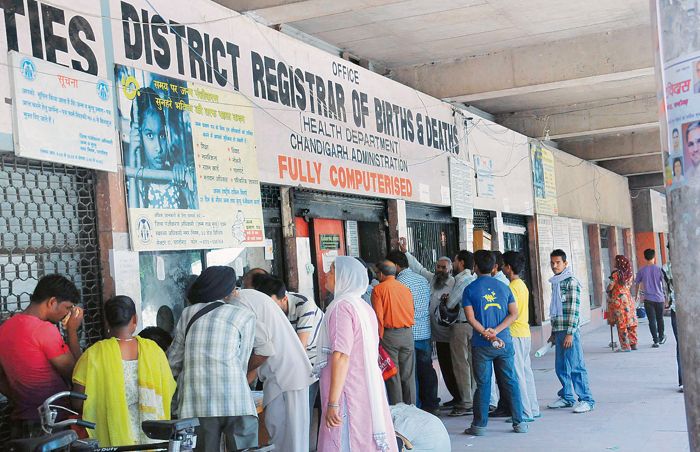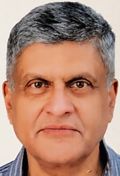
Neglected: The death registration is over 90 per cent in only seven states and UTs.
Gopalan Balagopal
Former bureaucrat.
It was early 2016. I was travelling through Bihar and Assam as part of a team commissioned by the Registrar-General of India (RGI) to assess the status of civil registration and suggest improvements. We had picked six states to get a picture of how births and deaths were registered. The registration rates by then had improved dramatically for births and somewhat more modestly for deaths the previous few years. However, one concern was about how poorly the reasons for which people had died were recorded. The forms used for this purpose followed the guidelines of the World Health Organisation (WHO) which set the international standards followed by all countries. The guidelines stipulate that the immediate cause for deaths and all underlying causes had to be identified and certified by a doctor. However, in almost every form we had seen in the two states, the statement of the doctor stated that the person had died from ‘cardio-respiratory failure’. This did not explain anything. There is no other way that death comes, except through failure of the heart and breathing.
I called my batchmate Sujatha Rao, who had been one of most respected union health secretaries. “I hope you have systems in the health sector that record causes of death?” I asked her. But worryingly, the answer was a no.
The WHO defines cause of death as the “disease or injury which initiated the train of morbid events leading directly to death, or the circumstances of the accident or violence which produced the fatal injury.” The attending physician, who is the best person who could see and decide which of the several conditions were responsible, was required to record the chain of events leading back to the cause of death. The form used for this would also record any other conditions that could have contributed to the death.
The mortality rates attributed to different causes of death that can be derived from these records provide key indicators to assess health trends in the population. These are of immense importance in assessing the effectiveness of public health programmes. They would help in determining priorities of health and medical research programmes and provide feedback for future health policy, planning and implementation.
The problem of missing or inaccurate recording of causes of death should be seen at two different levels. The first is to see how the levels of death registration itself can be improved so that the data gathered reflects the reality. In many countries, there is little incentive to register deaths, particularly where there are no inheritance claims involved. In some countries, the requirement of permits for disposal of the body ensures the registration of deaths. But where such restrictions are not in place or enforced, many deaths may go unregistered.
The level of death registration in India, according to the Report of the Home Ministry for 2019, is over 90 per cent in only seven states and union territories. It is between 80 and 90 per cent in another seven states and union territories. Efforts for increasing death registration through both stricter enforcement and involving local governments and civil society in spreading awareness about its importance needs attention.
Action also needs to be taken to ensure that whenever death registration is done, the cause of deaths is recorded accurately. The causes of death are recorded in only 22 per cent of the deaths registered, according to the RGI’s Report on the Medical Certification of Cause of Death (2017).
Goa is the only state that has a 100 per cent of its deaths registered with medical certification of causes of death. Among the larger states, Tamil Nadu with 43.3 per cent leads the list. The figure for medical certification of cause of death has been hovering under 20 per cent for many years. Medical certification of causes of death was extended to all medical facilities in 2012, but this has not had much of an effect on the ground.
Another problem concerns the poor quality in the recording of causes of death even where there are well-functioning civil registration systems. While the accuracy of recording of causes of death has improved over the years, the MCCD Report of 2017 has clarified that a second leading cause of death mentioned in the report as Symptoms, Signs and Abnormal Clinical & Laboratory Findings Not Elsewhere Classified (R00-R99) is a summation of causes that were not properly diagnosed and, so, should not be considered a cause of death.
Many people die outside hospitals, particularly in rural areas where there is no doctor available to identify causes of death. “Verbal autopsy” is a method that has been developed to use lay reporting by non-medical persons to provide the cause of death information in these circumstances. A person who would have known the person who died could be interviewed following a protocol to record any symptoms that could provide some information on the most probable cause of death. This could act as a stop-gap arrangement for providing the cause of deaths which could give reasonable results when aggregated.
The RGI introduced the Physician Coded Verbal Autonomy (PCVA) to estimate disease burden as part of the Sample Registration System (SRS) in 2003. The SRS captures about 0.5 per cent of the estimated deaths in India. This sample size is adequate to measure infant mortality, and to some extent, adult mortality, but it is too small to measure maternal mortality or life expectancy on an annual basis. The SRS was started in 1964 as a temporary arrangement to provide essential statistics for planning till such time as the civil registration system can provide comprehensive ‘vital statistics’. It is indicative of the neglect of the civil registration system as the system still lags behind.
When the Ebola epidemic of 2013-16 started in West Africa, the countries on the frontline of the epidemic, Liberia and Sierra Leone, did not have well-functioning systems for death registration or recording causes of death. A lot of concern was expressed at that time about the need to strengthen the civil registration systems worldwide. It is not clear how much things have changed. The global outbreak of Covid-19 is now a strong signal that no country should wait any more to fix these problems.
A lasting solution will come through systemic changes whereby causes of death can be captured in real time, ensuring the highest quality and using the most appropriate technology available. Meanwhile, recognition at the highest level on the need to improve the recording of cause of death is a precondition for any change to happen. A strong message from the top should go to all doctors and staff who perform the functions of certifying causes of death on their life-saving responsibilities. This should be followed by quick rounds of refresher training on how to do these tasks, to all the people who perform these tasks.
Join Whatsapp Channel of The Tribune for latest updates.




























